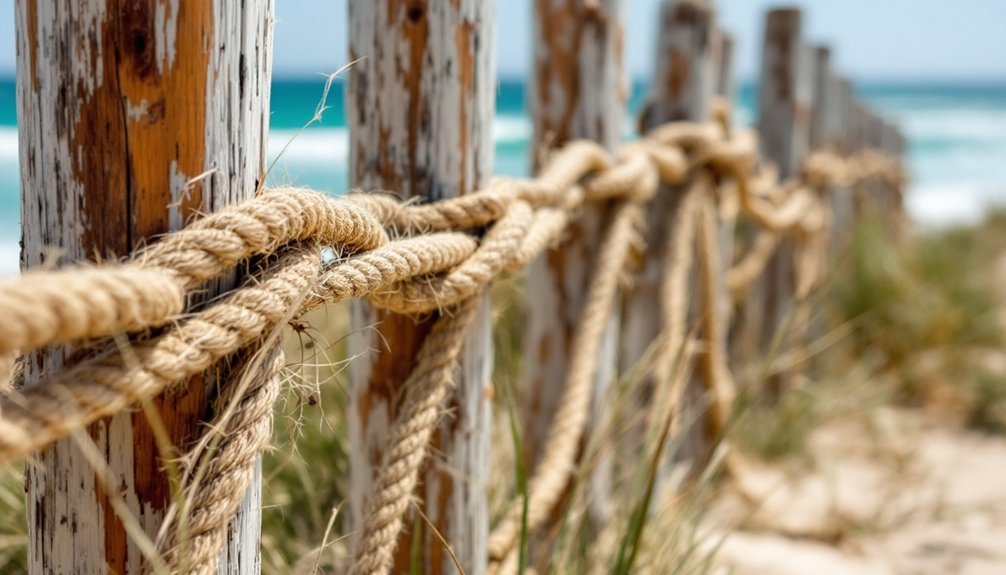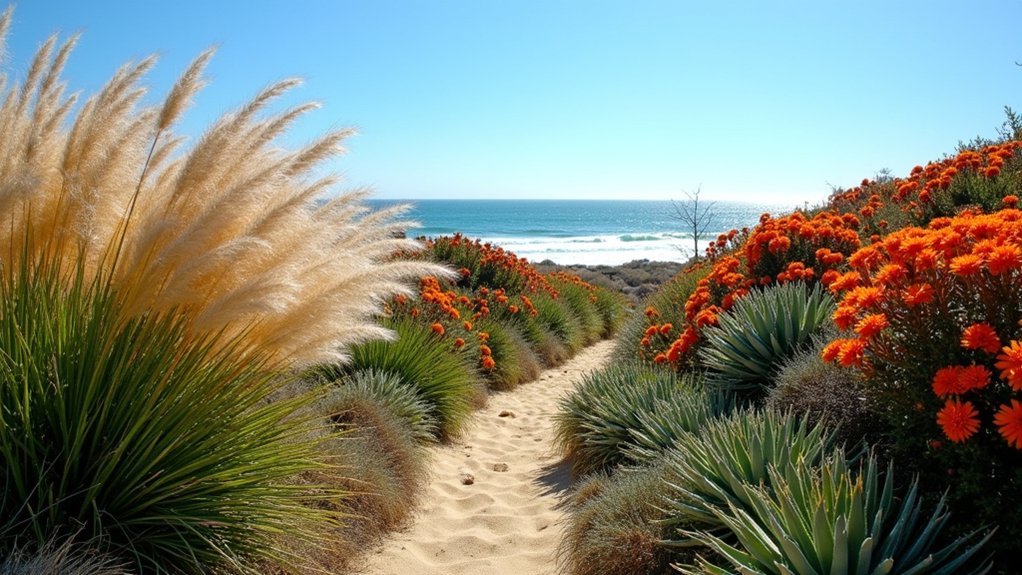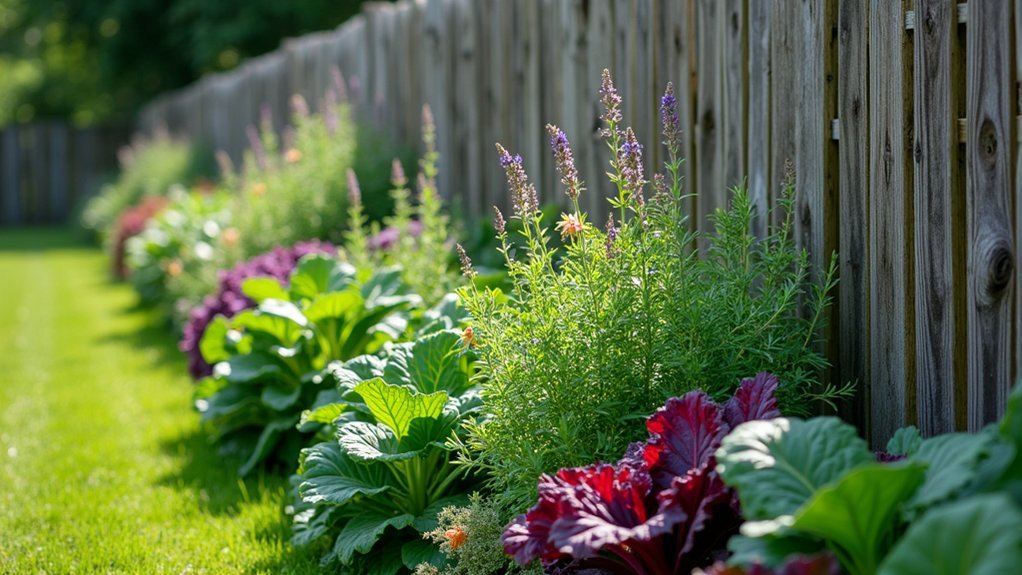You've invested time and money in your coastal property, so why compromise on the fencing materials? Marine-grade hemp ropes offer that perfect blend of rustic charm and practical durability that synthetic alternatives simply can't match. Selecting the right rope can mean the difference between a fence that withstands years of salt spray and harsh winds versus one that requires constant replacement. The best options balance strength, environmental considerations, and aesthetic appeal—but not all hemp ropes are created equal.
Hemp Rope (1inx50ft) for Crafts, Swings and Decor
For coastal homeowners seeking eco-conscious fencing solutions, the Caphremiel Hemp Rope offers an ideal combination of durability and environmental responsibility. This 1-inch thick, 50-foot length rope withstands harsh marine environments while remaining 100% biodegradable.
You'll appreciate its versatility beyond fencing—it's perfect for decorative railings, dock accessories, and nautical-themed design elements. At 6.52 pounds, it's substantial enough for structural applications yet manageable for DIY projects.
With a 4.9-star rating from verified customers, this Chinese-manufactured rope delivers impressive performance despite its initial hemp odor, which quickly dissipates after installation in your coastal setting.
Best For: Coastal property owners and DIY enthusiasts seeking a sustainable, durable rope solution for outdoor projects like fencing, decorative railings, dock accessories, and nautical-themed decor.
Pros:
- Made from 100% natural hemp fibers, making it completely biodegradable and environmentally friendly
- High durability and strength (6.52 pounds) make it suitable for structural applications and intense activities like tug of war
- Versatile application for multiple uses including crafts, porch swings, and coastal decor with excellent customer satisfaction (4.9/5 stars)
Cons:
- Initial hemp odor present (though it dissipates quickly after installation)
- Higher price point compared to synthetic rope alternatives (implied by quality materials)
- Country of origin (China) may be a concern for some customers seeking locally-sourced products
Twisted Manila Jute Rope (1 Inch x 10 Feet) for Crafts and Decoration
Craftsmen seeking robust natural materials for coastal aesthetics will find Twisted Manila Jute Rope an exceptional choice. This 1-inch diameter, 10-foot length rope boasts impressive 1080-pound tensile strength, making it the strongest natural fiber option available.
You'll appreciate its flexibility and treatment that minimizes oily residue and hard burrs. It's perfect for nautical-themed decorations on porches, decks, and railings. The biodegradable composition won't harm your garden plants when used as supports.
While you might notice a slight initial smell, it dissipates after about a week outdoors. Keep the rope dry to prevent mildew and remember it's designed for decoration, not climbing.
Best For: DIY enthusiasts and decorators seeking authentic natural rope for nautical-themed projects, garden supports, or rustic home accents where durability and aesthetic appeal are equally important.
Pros:
- Exceptional strength with 1080-pound tensile capacity, providing reliability for decorative applications like porch swings and railings
- Specially treated to reduce typical jute rope issues such as oily residue, black spots, and uncomfortable burrs
- Environmentally friendly biodegradable material that can be used in gardens without harming plants
Cons:
- Initial odor that requires approximately one week to dissipate when used outdoors
- Requires proper storage in dry conditions to prevent mildew development
- Not suitable for climbing or weight-bearing safety applications despite its strength
Manila Rope (1-1/2 Inch x 15 Feet) Natural Hemp Rope for Multiple Uses
Coastal property owners seeking versatile, weather-resistant materials will find four compelling reasons to choose this Manila rope for their fencing projects. At 1.6 inches thick and nearly 15 feet long, this robust jute fiber rope withstands harsh maritime conditions while maintaining its structural integrity.
You'll appreciate its resistance to UV rays, chemicals, and abrasions—critical for seaside installations. The four-strand twisted design delivers superior strength for heavy-duty applications, while its natural aesthetic complements coastal décor beautifully.
When installation day arrives, you can easily cut it to size (just tape before cutting to prevent fraying). At 4.39 pounds, it's substantial enough for security without being unwieldy.
Best For: Coastal homeowners looking for a naturally aesthetic, durable rope solution for fencing, railings, or decorative marine applications that can withstand harsh weather conditions.
Pros:
- Exceptional weather resistance against UV rays, chemicals, and temperature variations makes it ideal for long-term outdoor coastal use
- Four-strand twisted design provides superior strength and flexibility for heavy-duty applications while maintaining a rustic, natural aesthetic
- Versatile enough for multiple applications from decorative fencing to practical maritime uses, with easy cutting and sizing options
Cons:
- Initial oil coating causes an odor that requires 2-3 days of air drying before the smell dissipates
- At 4.39 pounds for 15 feet, it may be heavier and more challenging to handle than synthetic alternatives
- Requires additional preparation (taping before cutting) to prevent unbraiding and fraying during installation
Jute Rope (1.5in X 20FT) 100% Natural Hemp Rope
When durability meets eco-conscious design, this Jute Rope (1.5in X 20FT) becomes an essential component for your coastal fence projects. The 4-ply twisted construction creates reliable strength while maintaining flexibility for easy installation around fence posts.
You'll appreciate how this rope withstands harsh coastal conditions—from salt spray to intense sun exposure. Its air-dried processing eliminates unpleasant odors and imperfections common in lower-quality jute products.
While perfect for decorative fence wrapping and garden applications, be aware that some users report diminished durability after three months of continuous outdoor exposure. For maximum longevity, consider using it in semi-protected coastal environments.
Best For: Homeowners and DIY enthusiasts seeking an eco-friendly, aesthetically pleasing rope for decorative coastal fence projects, garden applications, and indoor crafts requiring medium-term durability.
Pros:
- Made from 100% natural jute fibers that are air-dried to eliminate odors and processed with oil for improved flexibility
- Versatile 1.5-inch thickness and 20-foot length makes it suitable for multiple applications from fence wrapping to home decor
- 4-ply twisted construction provides good strength while maintaining a natural aesthetic appeal for coastal and rustic design projects
Cons:
- Limited long-term durability with some users reporting deterioration after three months of continuous outdoor exposure
- Requires semi-protected environments for maximum longevity, especially in harsh coastal conditions
- Despite being marketed as "hemp rope" in the title, the product is actually made of jute, which may confuse customers expecting hemp material
Natural Hemp Rope 49 Feet (All Purpose Cord for Crafts and Gardening)
For homeowners seeking an eco-friendly alternative to synthetic materials, this 49-foot Natural Hemp Rope offers three compelling benefits. The 1/2-inch diameter cord provides impressive strength, supporting over 1,000 pounds for your coastal fencing needs.
You'll appreciate its versatility beyond fencing—it's excellent for hanging planters, creating nautical decorative elements, or boundary markers along beachfront properties. The biodegradable jute-colored rope weathers coastal conditions while maintaining its rustic aesthetic.
Though you'll need to manage some fiber shedding during installation, most users find the thick, four-twisted design worth this minor inconvenience, especially when creating natural-looking property boundaries.
Best For: Homeowners and DIY enthusiasts looking for a strong, eco-friendly natural rope for coastal property projects, garden decorations, and rustic home decor.
Pros:
- Impressive strength that can support over 1,000 pounds, making it suitable for hanging planters and functional applications
- 100% biodegradable and eco-friendly material that maintains its rustic aesthetic even in coastal conditions
- Versatile 49-foot length with 1/2-inch diameter perfect for multiple applications from crafts to property boundaries
Cons:
- Tends to shed fibers during installation and handling, requiring cleanup after project completion
- Requires careful twisting to prevent unwinding when cut or worked with
- May have a mild natural smell that some users might find noticeable in indoor applications
1-1/2 in Natural Thick Hemp Rope 50 Ft for Swing, Railings and Crafts
Homeowners seeking eco-friendly fence solutions will find Chmentnanza's 1-1/2 inch hemp rope an exceptional choice for coastal projects. At 50 feet long with an impressive 2063-pound tensile strength, you'll have ample material for railings and decorative elements.
The four-strand braided construction resists rot—a vital feature for humid coastal environments. You'll appreciate the rope's natural brown aesthetics that complement beachfront properties while remaining biodegradable.
At 12.65 pounds, it's substantial enough for permanent installations yet manageable for DIY projects. The tight braiding prevents frustrating unraveling under tension, making it ideal for areas exposed to constant sea breezes and occasional storms.
Best For: Homeowners who want an eco-friendly, durable natural rope for decorative coastal railings, garden fencing, or rustic outdoor projects requiring substantial tensile strength.
Pros:
- Impressive 2063-pound tensile strength makes it suitable for load-bearing applications like swings and railings
- Four-strand braided construction provides excellent rot resistance, ideal for outdoor and humid environments
- Natural biodegradable hemp material offers both environmental benefits and rustic aesthetic appeal
Cons:
- Relatively heavy at 12.65 pounds, which may make installation more challenging for some DIY projects
- Higher price point compared to synthetic rope alternatives with similar strength ratings
- Made in China, which may concern those looking for domestically produced natural products
KINGLAKE GARDEN Jute Rope (1/4 inch x 164 Feet Hemp Rope)
Coastal property enthusiasts seeking a blend of rustic charm and practical durability will find KINGLAKE GARDEN's Jute Rope an excellent addition to their marine fencing projects. This Chinese-made rope measures 1/4 inch thick and spans an impressive 164 feet, giving you ample material for extensive installations.
You'll appreciate how the three-strand construction withstands harsh coastal elements including rain, wind, and sun exposure. Though marketed as jute, this natural fiber rope offers the aesthetic appeal of hemp while remaining easy to manipulate. At just 1.26 pounds, it's lightweight yet strong enough for decorative fencing applications where visual appeal matters as much as functionality.
Best For: Homeowners and DIY enthusiasts looking for a versatile, natural fiber rope for gardening projects, crafts, decorative purposes, and light outdoor applications where aesthetics matter.
Pros:
- Made from natural jute fibers with three-strand construction for enhanced strength and durability
- Versatile for multiple applications including gardening, crafting, decorations, and outdoor projects
- Easy to handle at 1.26 pounds for 164 feet, with a soft texture that's comfortable to work with
Cons:
- May become tangled upon initial unpacking, requiring time to straighten out
- Not as durable as synthetic ropes for heavy-duty or long-term outdoor applications
- Limited to lighter applications despite being marketed as "heavy duty" with a 1/4 inch diameter
Natural Hemp Rope (1 in X 50 Ft) for Crafts, Decor and Landscaping
Serious DIY craftspeople and coastal property owners will appreciate the exceptional versatility of our Natural Hemp Rope (1 in X 50 Ft). Made from premium 4-strand jute, this heavy-duty 1-inch diameter rope delivers superior strength for your maritime fence projects.
At 6.52 pounds and 50 feet in length, you'll have ample material for railings, dock accents, or decorative boundaries. The natural brown fibers contain protective oil for enhanced durability against salt air and coastal elements. With a 4.7-star rating from 250 reviews, it's proven reliable for load-bearing applications while remaining environmentally friendly with biodegradable properties.
Best For: Craftspeople, DIY enthusiasts, and coastal property owners looking for a strong, natural rope solution for decorative maritime projects, landscaping elements, or functional outdoor applications requiring durability in harsh environments.
Pros:
- Premium 4-strand jute construction provides exceptional strength and load-bearing capacity for heavy-duty applications like porch swings and railings
- Natural oil treatment enhances flexibility and weather resistance, making it suitable for coastal environments and outdoor exposure
- Environmentally friendly with biodegradable properties, offering a sustainable alternative to synthetic ropes without sacrificing durability
Cons:
- At 6.52 pounds, the rope is relatively heavy compared to synthetic alternatives, potentially making handling more difficult for some users
- Natural fiber construction may require more maintenance and eventual replacement compared to non-biodegradable synthetic options
- Made in China, which may be a concern for those specifically seeking domestically produced rope products
SGT KNOTS Twisted ProManila Synthetic Rope for Outdoor Use
Experienced fence builders and DIY enthusiasts seeking a reliable option for coastal projects will find SGT KNOTS Twisted ProManila Synthetic Rope an excellent choice. This USA-made synthetic alternative offers superior durability against harsh coastal conditions while maintaining the authentic tan appearance of natural manila.
At just 2.14 pounds for the 1/4-inch x 200-foot option, you'll get a lightweight yet strong rope that resists UV damage, chemicals, and abrasion. It won't kink or rot like traditional hemp and maintains strong knots even in wet conditions.
As a veteran-owned company, SGT KNOTS delivers quality with various diameter and length options to fit your specific coastal fencing needs.
Best For: Coastal property owners, marine enthusiasts, and outdoor DIY project builders looking for a durable, weather-resistant rope that mimics the appearance of natural manila without the susceptibility to rot or degradation.
Pros:
- Lightweight synthetic construction (2.14 pounds for 200 feet) offers superior strength-to-weight ratio while maintaining high resistance to UV damage, chemicals, and harsh weather conditions
- Made in the USA by a veteran-owned company with multiple size options ranging from 1/4 inch to 2 inches in diameter and lengths from 10 to 600 feet
- Maintains the authentic tan appearance of natural manila rope while offering better longevity, knot retention, and performance in wet environments
Cons:
- Despite mimicking natural manila appearance, some traditionalists may still prefer the authentic natural fiber feel and patina that develops with genuine manila rope
- Synthetic material may not have the same environmental biodegradability as natural fiber alternatives
- Limited color options (only available in tan) compared to other synthetic ropes that come in multiple vibrant colors for decorative projects
1 X 100 Treated Manila Rope Boat Docks Tree Farm Dock Deck
The X 100 Treated Manila Rope stands out as the perfect choice for dock owners facing the harsh realities of marine environments. Made from premium hemp stem fiber and featuring a 4-strand tight braid construction, this 1-inch diameter rope delivers impressive 1,000 kg tensile strength.
You'll appreciate its resistance to temperature fluctuations, abrasion, and harsh weather—critical for coastal applications. While it shrinks slightly when wet, it returns to original size upon drying. At 100 feet long and weighing just under 14 pounds, it's manageable yet substantial enough for serious projects. Store it in dry, ventilated areas and tape cut ends to prevent unraveling.
Best For: Dock owners, boaters, and outdoor enthusiasts seeking a durable, high-strength natural rope solution for marine environments, landscaping projects, or decorative applications.
Pros:
- Impressive 1,000 kg tensile strength with 4-strand tight braid construction provides exceptional durability
- Weather and abrasion resistant, making it ideal for harsh outdoor and marine environments
- Versatile applications from dock lines to decorative railings to garden projects
Cons:
- Shrinks temporarily when wet, which may require accounting for length changes in certain applications
- Requires proper storage in dry, ventilated areas to maintain optimal condition
- At nearly 14 pounds, the full 100-foot length may be challenging for some users to handle alone
Factors to Consider When Choosing the Most Durable Marine-Grade Hemp Rope for Coastal Fence Projects
When selecting marine-grade hemp rope for your coastal fence project, you'll need to evaluate five essential factors that determine long-term performance. You should assess the rope's strength and load capacity, saltwater resistance, and UV degradation prevention measures, while also considering its biodegradability timeline for environmental planning. Your choice of rope diameter will ultimately affect both the aesthetic appeal and functional durability of your coastal installation.
Strength and Load Capacity
Selecting the right marine-grade hemp rope requires careful consideration of strength and load capacity, especially for coastal fence projects where environmental stresses are constant.
Look for tensile strength exceeding 1,000 lbs to guarantee your rope withstands harsh coastal conditions. Your rope should be rated to hold at least three times the anticipated maximum load to account for safety margins and dynamic forces from wind or waves.
Four-strand twisted designs offer superior strength and improved resistance against saltwater abrasion and UV damage. Don't overlook diameter specifications—thicker ropes provide greater strength and load-bearing capabilities, making them ideal for structural fencing applications.
When evaluating options, prioritize ropes that maintain their integrity despite extreme weather, chemicals, and prolonged sun exposure. These considerations will help you select hemp rope that delivers reliable performance in demanding coastal environments.
Saltwater Resistance Properties
Durability in harsh marine environments hinges primarily on your hemp rope's saltwater resistance properties. Marine-grade options undergo specialized treatments that create a protective barrier against saltwater's corrosive effects, preventing the premature breakdown that plagues untreated natural fibers.
When selecting rope for coastal fencing, look specifically for products labeled "marine-grade" with clear saltwater resistance specifications. These ropes feature treatments that not only combat salt degradation but often include UV protection enhancements—critical for exposed coastal installations where sun damage compounds saltwater effects.
To maximize your investment, implement a regular maintenance routine: rinse ropes periodically to remove salt buildup and store them properly when not in use. These simple steps, combined with quality marine-grade hemp, will guarantee your coastal fence withstands the challenging seaside conditions year after year.
UV Degradation Prevention
UV radiation presents a formidable challenge for coastal fence projects, working alongside saltwater to accelerate hemp rope deterioration. When selecting marine-grade hemp ropes, you'll need to prioritize those specifically treated with UV-resistant coatings or additives that prevent fiber breakdown.
Without proper protection, UV exposure can slash your rope's tensile strength by up to 50% in just a few months—a costly vulnerability for any coastal installation. Opt for tightly braided constructions that provide better surface coverage, effectively shielding inner fibers from direct sunlight.
Even with initial treatments, you'll need to implement regular inspection routines. Plan to reapply protective coatings periodically to maintain UV resistance. This preventative maintenance greatly extends your hemp rope's lifespan, ensuring your coastal fence project withstands the harsh combination of sun and sea.
Biodegradability Timeline Considerations
While hemp rope offers excellent environmental benefits for coastal installations, you must balance its biodegradability against your project's longevity requirements. Standard marine-grade hemp ropes typically degrade within 6 months to 2 years in water environments, with saltwater exposure often accelerating this process.
For coastal fence projects, you'll need to account for several environmental factors affecting degradation rates. Moisture levels, temperature fluctuations, and local microbial activity all impact how quickly your rope will break down. Ropes with oil treatments may temporarily resist degradation but will eventually succumb to natural processes.
If sustainability is your priority, hemp's biodegradability is advantageous for reducing marine waste. However, you'll need to implement a more frequent replacement schedule than with synthetic alternatives, particularly in harsh saltwater conditions where degradation occurs more rapidly.
Rope Diameter Selection
Selecting the appropriate diameter for your hemp rope represents one of the most critical decisions you'll make for coastal fence projects. A minimum 1-inch diameter is recommended for most coastal applications, providing the durability needed to withstand saltwater exposure and UV degradation.
For projects facing severe coastal conditions or supporting heavier loads, consider upgrading to 1.5-inch rope. This thickness offers superior tensile strength and considerably better abrasion resistance—crucial for installations directly exposed to sea spray and high winds.
While thicker ropes (1.5-2 inches) deliver maximum strength and longevity, they're less flexible and potentially more challenging to work with during installation. Always match your rope's diameter to your specific environmental conditions and weight requirements rather than automatically choosing the thickest option available.
Weather Impact Resistance
Beyond diameter considerations, the weather resistance of your hemp rope will ultimately determine its performance in coastal environments. Look for options with enhanced UV protection to prevent the rope from weakening when constantly exposed to harsh sunlight. The sun's rays can break down fibers over time, compromising structural integrity.
Your rope should also be specifically treated to withstand saltwater exposure and persistent humidity. These elements quickly degrade standard hemp, but marine-grade versions feature tight braiding and protective treatments that greatly extend their lifespan.
When selecting rope for your coastal fence project, prioritize products with high tensile strength ratings that won't diminish under environmental stress. The best options will balance durability with eco-friendliness, eventually biodegrading naturally without creating permanent waste while still delivering years of reliable performance.
Maintenance Requirements Assessment
Despite their specialized treatments, marine-grade hemp ropes require consistent maintenance to achieve the best lifespan in harsh coastal environments. You'll need to inspect your ropes regularly for signs of wear, fraying, or salt damage—particularly after storms or prolonged exposure to intense sun.
Make it a habit to rinse your fence ropes with fresh water to remove salt buildup and debris that accelerate deterioration. When not in use, store any extra rope in dry, well-ventilated areas to prevent mildew and rot from taking hold.
For maximum protection, you'll want to reapply protective coatings periodically based on your specific coastal conditions. Don't hesitate to replace damaged sections immediately rather than waiting for complete failure—this proactive approach guarantees your fence maintains its structural integrity and aesthetic appeal throughout the seasons.
Frequently Asked Questions
How Does Saltwater Exposure Affect Hemp Rope Durability?
Saltwater exposure rapidly degrades hemp rope, causing it to weaken, rot, and break down. You'll notice fibers swelling, stiffening, and developing mold or mildew. Without protective treatments, your rope won't last in marine environments.
Can I Dye Marine-Grade Hemp Rope Without Compromising Strength?
Yes, you can dye marine-grade hemp rope using natural dyes or fabric dyes specifically formulated for natural fibers. Just make certain you're not using harsh chemicals that'll degrade the fibers and compromise the rope's structural integrity.
What Knots Work Best for Coastal Fence Installations?
You'll want to use bowline knots for securing endpoints, clove hitches for posts, and carrick bends for joining ropes. Don't forget constrictor knots for temporary holds during installation. They'll resist loosening in coastal conditions.
How Often Should Marine Hemp Ropes Be Replaced in Coastal Environments?
You'll need to replace marine hemp ropes every 1-2 years in coastal environments. Salt spray, UV exposure, and moisture accelerate deterioration. Inspect quarterly and replace immediately if you notice fraying, discoloration, or stiffness.
Is Synthetic Hemp Better Than Natural for High-Tide Areas?
Yes, synthetic hemp is better for high-tide areas. You'll find it resists rot and degradation from saltwater exposure, unlike natural hemp. It's more expensive, but you won't need to replace it nearly as often.





Leave a Reply